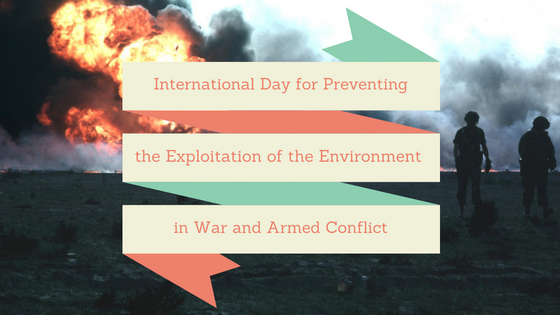
United Nations General Assembly et al.
UNITED NATIONS (November 5, 2019) — Over the last couple of years, a growing group of NGOs, academics and experts have put out a joint statements on November 6, the International Day for Preventing the Exploitation of the Environment in War and Armed Conflict.
This year we witnessed again how the environment can be used a weapon by burning down crop fields, attacking oil infrastructures, or how conflicts link to deforestation and putting pressure on natural resources people and communities depend on.
Last year’s statement saw over 55 NGOs and experts signatures and we aim to push this further this year. There is a growing interest to find legal and policy solutions in multinational forum, we see engaged communities in conflict-affected states protesting against conflict-linked environmental degradation and a growing awareness among policy makers and citizens alike that the environment matters for our and future generations.
On 5 November 2001, the UN General Assembly declared 6 November of each year as the International Day for Preventing the Exploitation of the Environment in War and Armed Conflict (A/RES/56/4).
Though humanity has always counted its war casualties in terms of dead and wounded soldiers and civilians, destroyed cities and livelihoods, the environment has often remained the unpublicized victim of war. Water wells have been polluted, crops torched, forests cut down, soils poisoned, and animals killed to gain military advantage.
Furthermore, the United Nations Environment Programme (UNEP) has found that over the last 60 years, at least 40 percent of all internal conflicts have been linked to the exploitation of natural resources, whether high-value resources such as timber, diamonds, gold and oil, or scarce resources such as fertile land and water. Conflicts involving natural resources have also been found to be twice as likely to relapse.
The United Nations attaches great importance to ensuring that action on the environment is part of conflict prevention, peacekeeping and peacebuilding strategies, because there can be no durable peace if the natural resources that sustain livelihoods and ecosystems are destroyed.
On 27 May 2016, the United Nations Environment Assembly adopted resolution UNEP/EA.2/Res.15, which recognized the role of healthy ecosystems and sustainably managed resources in reducing the risk of armed conflict, and reaffirmed its strong commitment to the full implementation of the Sustainable Development Goals listed in General Assembly resolution 70/1, entitled “Transforming our world: the 2030 Agenda for Sustainable Development”.
We, a group of NGOs, academics and experts, would encourage your organisation or you as an expert, to sign the statement, share it with partners and experts. We will put the statement online on November 6 and share images for social media and using the #EnvConfDay to promote the statement.

From words to action: time to act on the environment, peace and security
Over the past year, the crises facing the global environment have become more visible than ever before. The climate emergency, biodiversity collapse, plastic pollution and the murder of environmental defenders have driven powerful civil society movements demanding change. Now is the time for leadership and bold actions to deliver this change and safeguard our environment.
Just as international civil society movements are demanding bold action to combat global environmental threats, so communities and activists in states affected by conflicts are calling for action to prevent and address the environmental consequences of wars.
Whether it is the deliberate burning of crops in the Middle East, massive deforestation in protected areas in Colombia, or attacks on water and oil infrastructure in Libya, Iraq, Saudi Arabia, Yemen and Syria, it is the environment and the people depending on it that suffer.
Environmental degradation threatens peace and security, while conflicts can have a devastating impact on ecosystems, and on human health and livelihoods. By reversing sustainable development, they undermine progress towards tackling the massive environmental challenges that we face in the 21st century. Peace and security relies on healthy and productive ecosystems and a protected environment, just as environmental protection relies on peaceful societies.
Our signatories are drawn from many different organisations and experts who are working together to improve our understanding of the connections between the environment, peace and security and to identify opportunities to protect people and ecosystems. And there is no shortage of opportunities.
Where once the environment was a “silent victim” of conflicts, on-the-ground data collection and reporting, innovative research and technologies are improving the visibility of environmental damage and our understanding of its causes. This information will help drive the development of the transformative policies that are urgently needed to reduce harm and help build peace.
We welcome the many initiatives that have emerged in recent years on the environmental dimensions of armed conflicts. From local advocacy to international legal and security policy debates, to new processes to integrate environmental protection into humanitarian response and post-conflict recovery.
But in many cases these initiatives have not yet translated into change on the ground and, just as 2019 has highlighted the urgency of action to address global environmental crises, so it is also time for bold action from the international community on the environment, peace and security.
To move from words to action this #envconflictday, the international community must:
- Establish the capacity to identify, act on and mitigate the environmental risks that can lead to armed conflicts.
- Strengthen, implement and respect the laws protecting the environment in relation to armed conflicts, and hold those responsible for harm to account.
- Assess environmental risks and assist victims after conflicts, remediate damage, and employ all the biologically sound tools at its disposal to regenerate ecosystems while supporting communities to build sustainable peace.
